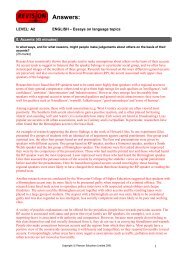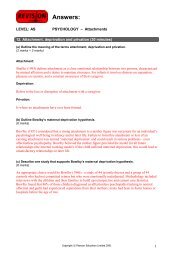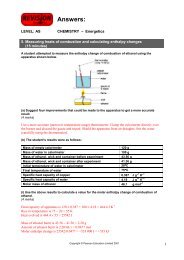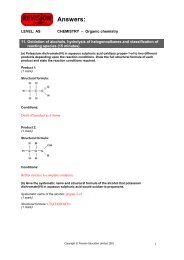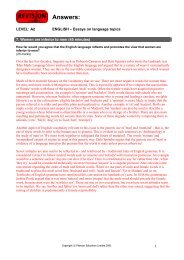The Dove Campaign for Real Beauty - Pearson
The Dove Campaign for Real Beauty - Pearson
The Dove Campaign for Real Beauty - Pearson
Create successful ePaper yourself
Turn your PDF publications into a flip-book with our unique Google optimized e-Paper software.
Chapter 2 Sustainable marketing: marketing ethics and social responsibilitygood citizens and from that achieve contentment. Well, most people! And how aboutbeing a good citizen of a gang of hooligans?It was a long time be<strong>for</strong>e Western philosophy recovered from these Greeks, butthe Renaissance got things going again. Machiavelli was born in another city state:Florence.…2.2‘He may be dung, but at least he’s our dung’Machiavelli (1469–1527) was an observer rather than a philosopher. After he sawwhat succeeded, he recognised that politics and morality mix badly. This is aconvenient view <strong>for</strong> business leaders who think there should be two sets of moralstandards: one <strong>for</strong> public life and one <strong>for</strong> private life. In political and business life itis necessary to be pragmatic and prudent – in other words, unethical – while retaininga different private ethic. As recent politicians have found, life does not always divideso easily.Solitary, poor, nasty, brutish and short<strong>The</strong> English Royalist Hobbes (1588–1678) is even more depressing than Machiavelli.People are awful and are prevented from degenerating into our natural brutishbehaviour only by realising that everyone behaving that way would make lifeunbearable. People there<strong>for</strong>e establish a ‘social contract’ (which parents call‘bringing up’) that has to be en<strong>for</strong>ced by a neutral third party (government contract).Franco-Swiss Rousseau (1712–78) had the opposite view that humanity is essentiallygood, but is corrupted by society to want things like smart clothes, carriages andNike trainers.Sum happinessEnglish Utilitarians Bentham (1748–1832) and Mill (1806–73) invented a <strong>for</strong>m of moralcalculus. Bentham thought his country’s laws were in a mess because they lacked ascientific foundation. He saw human beings as pleasure–pain machines, so hesuggested that law makers should balance the sum of the pain and pleasure toachieve ‘the greatest happiness of the greatest number’. This has two consequences:means justifying ends and problems <strong>for</strong> minority groups. Mills worried about this‘tyranny of the majority’. He preferred talking about happiness rather than pleasure,tolerated individual lifestyles and thought that the ‘happiness sums’ varied and were<strong>for</strong> individuals as well as law makers.▼105



